Ofsted has highlighted the key principles of teaching a “high-quality” English curriculum as its latest research review warns the subject is “fundamental” to pupils’ success in all subjects.
The watchdog today published its tenth subject research review, which focuses on English.
Previously it has covered subjects such as science, maths, and computing.
The latest review focuses largely on the importance of reading progression, but also warns that the subject is declining in popularity – with the number of A-level pupils dropping from 84,037 to 57,912 between 2010 and 2019.
Ofsted’s chief inspector Amanda Spielman added: “More than any other subject, English – and especially reading – is fundamental to pupils’ educational success.”
Here’s your trusty Schools Week speed read.
1. Don’t rely on different techniques for SEND pupils
The review states that research has found pupils with special educational needs and disabilities (SEND) “do not generally benefit from differentiated teaching, activities or resources to achieve a curriculum goal”.
Ofsted say that struggling pupils should have “more opportunities for repetition” to secure essential knowledge, but high-quality teaching “does not rely on differentiated teaching”.
The report added: “Teachers may attribute weaknesses in reading to a pupil having dyslexia rather than having gaps in their phonic knowledge”. This, it states, can also lead to teachers using interventions that have an alternative teaching approach, rather than systematic synthetic phonics.
But the review adds that “reading requires the same phonic knowledge for all children.”
2. Pupils should read increasingly complex texts
Ofsted said that the choice of texts studied is “critically important” to pupils’ development and an effective curriculum will feature “increasingly challenging texts”.

Understanding the different factors which contribute to the “challenge of a text” will allow schools to construct a curriculum “that builds readiness for future reading”.
The review states that pupils will benefit from the opportunity to read whole texts and the study of “one substantial complex text can do a lot of curricular ‘heavy lifting’”.
Research from the University of Sussex found weaker readers aged between 12 and 14 made “16 months’ progress in reading comprehension when they read two challenging novels in class in 12 weeks”.
3. Narrow the gap between word-rich and word-poor
Ofsted warns that at both primary and secondary level, the gap between word-rich and word-poor “correlates with lasting socio-economic and health inequalities”.
Pupils with a language deficit at five-years-old are four times more likely to have reading difficulties as adults, the review states.
As such teachers, especially in the early years, must explicitly develop vocabulary and “enable disadvantaged children to develop their vocabulary faster”.
4. Curriculum develops a ‘genuine love of literature’
The curriculum should be designed to develop in pupils a “genuine love of literature” and the ability to respond to texts personally, the review advises.
Teachers should encourage pupils to read for pleasure but they should also introduce them to texts “that they would not choose to read for themselves”.

Spielman added: “Through studying literature, pupils’ eyes are opened to the human experience; they explore meaning and ambiguity as well as the beauty and power of language.”
5. Focus on building knowledge – not answering examination Qs
Teachers should use assessment information which identifies pupils’ misconceptions, gaps and errors to “adapt the curriculum”.
But teaching should focus on “ building pupils’ prerequisite knowledge rather than on practice for answering examination questions”.
Ofsted explains this is because mark schemes for English exams “typically describe differences in the quality” of pupils’ answers rather than “the range of curriculum content that pupils need to learn”.
Treating mark schemes as the curriculum for pupils to master means pupils “may not acquire the very prior knowledge they need for final summative assessments”.
















Ironically there is a spelling error in the article